Memory Performance on AMD's A-Series APU
We've had a number of readers write in saying that it was great that we tested this platform with 1866MHz memory, but they are building budget systems and want to use 1333MHz or 1600MHz memory. It is true that we didn't look at performance numbers of AMD's A-Series APUs on the A75 chipset at 1333MHz, 1600MHz and since this platform is very budget friendly we see this as a valid point.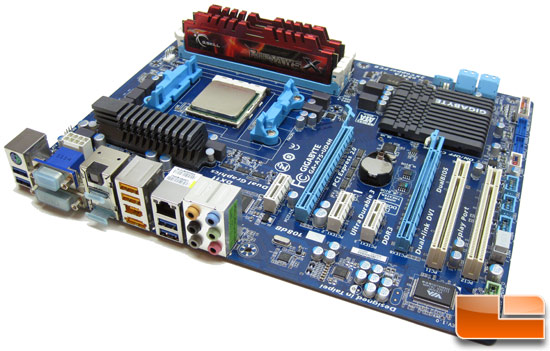
Legit Reviews does not want to ostracize any of our readers and pride ourselves on our no-BS straight forward and honest reviews, so we went back to the drawing board to get you the performance data you need before ordering in a new platform. We'll be using the Gigabyte GA-A75-UD4H motherboard for testing again, but since we updated the BIOS to version F3 we re-did all of the performance numbers as we did see improved performance with the new BIOS.
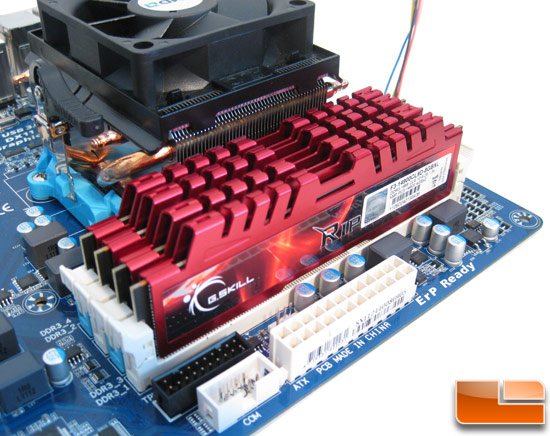
We also got a few questions about how the platform handles 16GB of memory and if there are any stability issues with running all four memory slots fully populated. We've seen performance gains with all the memory slots full on AMD platforms in the past, so we'll be looking at 2x4GB and 4x4GB performance as well in our test results. Not too many people will be running 16GB of memory on the Llano A-Series APU, but we found no issues in doing so with G.Skill Ripjaws
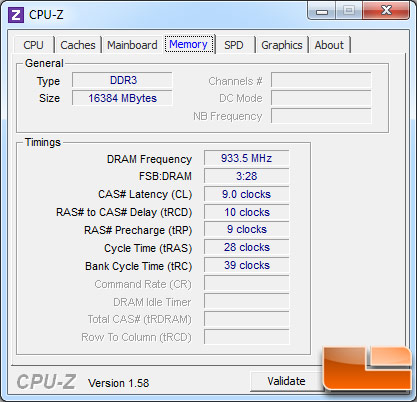
So, to reiterate what our goals are for this article one more time:
- Benchmark 2x4GB memory kits at 1333MHz, 1600MHz, 1866MHz to find performance differences
- Benchmark 2x4GB versus 4x4GB to see if filling all the memory slots impacts performance
- See if we have any issues running 16GB of memory
The Test System
Before we look at the numbers, here is a brief glance at the test system that was used. All testing was done on a fresh install of Windows 7 Ultimate 64-bit. All benchmarks were completed on the desktop with no other software programs running.The AMD Test System:
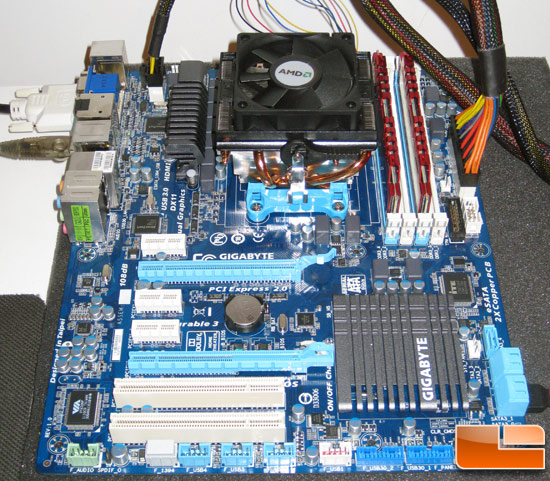
The test system was run in dual-channel memory in four configurations:
- 2x4GB at 1333MHz with 8-8-8-24 1T timings and 1.50V
- 2x4GB at 1600MHz with 8-8-8-24 1T timings and 1.50V
- 2x4GB at 1866MHz with 9-10-9-28 1T timings and 1.50V
- 4x4GB at 1866MHz with 9-10-9-28 1T timings and 1.50V
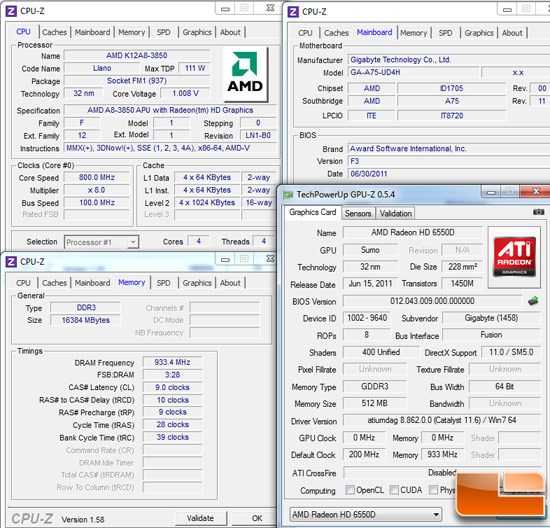
The integrated graphics comes up as Radeon HD 6550D according to GPU-Z and we used AMD CATALYST 11.6 drivers was used for testing.
| AMD Test Platform | |||||
|---|---|---|---|---|---|
| Component | Brand/Model | ||||
| Processor | A8-3850 | ||||
| Motherboard | Gigabyte GA-A75M | ||||
| Memory | 8GB GSKILL Ripjaws 1866 | ||||
| Video Card | n/a | ||||
| Hard Drive | Crucial C300 256GB SSD | ||||
| Cooling | AMD Retail Boxed | ||||
| Power Supply | Corsair HX850W | ||||
| Operating System | Windows 7 Ultimate 64-Bit | ||||
Sisoft Sandra 2011 SP3
The Sisoft Sandra 2011 SP3 benchmark utility just came out a few weeks ago and we have started to include it in our benchmarking. Sandra 2011 comes with support for Virtualisation (Virtual PC/Server, Hyper-V, VMware) and GPGPU (OpenCL, DirectX 11 DirectCompute), but today we will be using the program to look at memory and CPU performance!
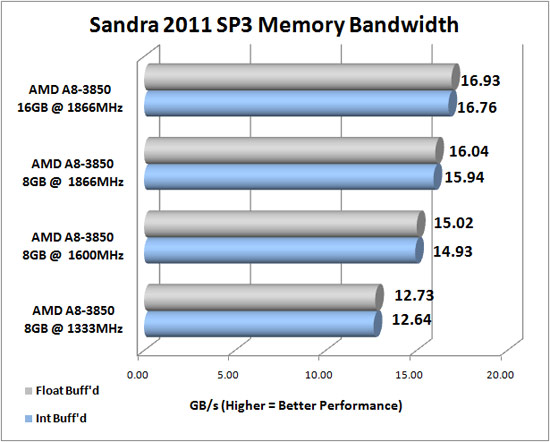
Results: Our test system uses the AMD A8-3850 'Llano' APU and as you can see from the Sandra Memory Bandwidth test results the memory clock speed greatly impacts the memory bandwidth. The 2x4GB 1333MHz CL8 memory kit was able to hit ~12.7GB/s memory bandwidth. Moving up to the 2x4GB 1600MHz CL8 memory kit we saw the bandwidth jump up to ~15.0GB/s, which is a 18% improvement over 1333MHz. The jump up to the 2x4GB 1866MHz CL9 memory kit was only 1GB/s, but we had to loosen the timings from 8-8-8-24 1T to 9-10-9-28 1T and the looser timings always hurt performance. Running the 4x4GB 1866MHz CL9 memory kit offered the most performance as once again we found that this AMD APU loved having all the memory banks occupied and with more memory lanes available for the APU the performance was able to improve.
Since we are looking at memory performance in this article we felt that memory latency needs to be looked at, so we ran the Sandra Memory Latency benchmark to see what the performance looked like.
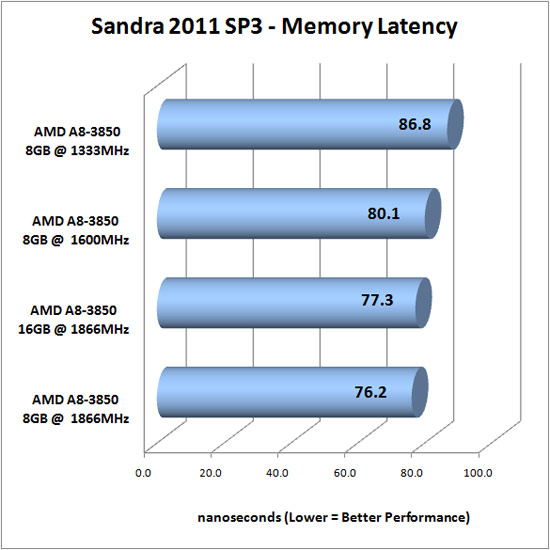
Results: We found that the 1333MHz memory kit had a memory latency of 86.8ns, 1600MHz was at 80.1ns and 1866MHz was 76.2ns. It was a bit odd to see the 4x4GB 1866MHz CL9 kit running slower than the 2x4GB 1866MHz CL9 kit, but the difference is not significant or a concern.
x264 HD Encoding
This application did fairly well when run on 4 threads, as you can see from the screen shot above. The first pass was not using all of the processing power available on the four cores, but on the second pass all 4 threads were at ~98% load.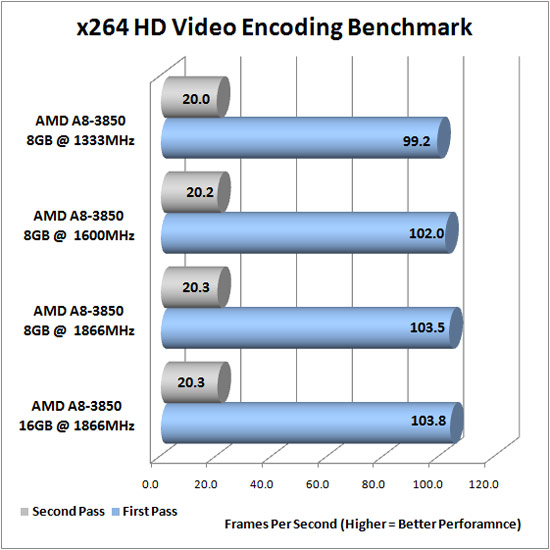
Benchmark Results: Running the x264 HD benchmark showed that running an 1866MHz memory kit with an AMD A-Series APU means you'll get roughly 4% better performance than a system running 1333MHz memory. We are talking small differences here between all three memory speeds, but the results are measurable and repeatable.
Handbrake
HandBrake is an open-source, GPL-licensed, multiplatform, multithreaded video transcoder, available for MacOS X, Linux and Windows. It is popular today as it allows you to transcode multiple input video formats to h.264 output format and is highly multithreaded.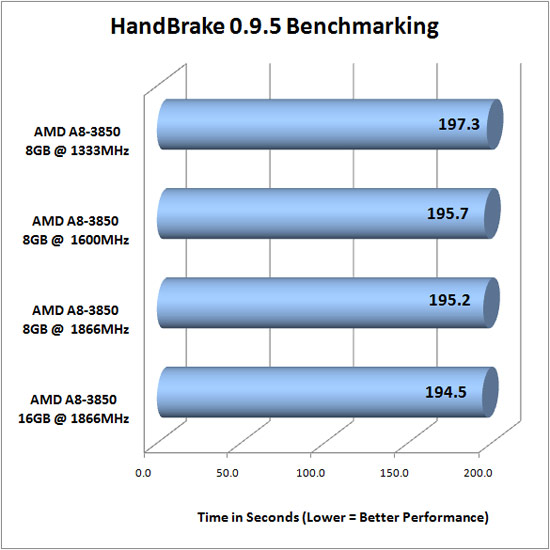
Resident Evil 5
This game title runs on up to four threads as you can see from the task manager shot above that was taken on a test system that was running the Intel Core i7-2820QM processor.
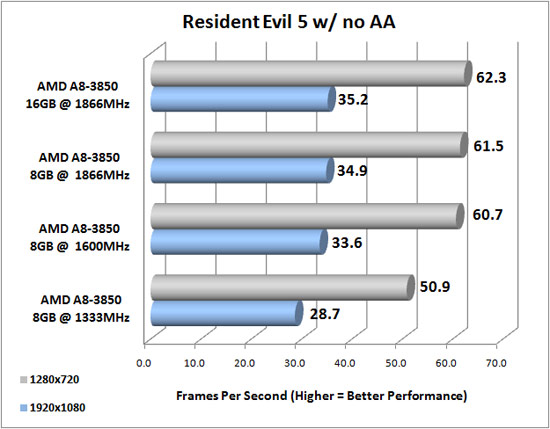
Benchmark Results: We had a gut feeling that gaming performance would be the most impacted area when it comes to performance across different memory speeds on the AMD A-Series APU and we found that to be very true. Running the 2x4GB 1333MHz CL8 memory kit we were able to get 50.9FPS at a resolution of 1280x720. Switching to the 2x4GB 1600MHz CL8 memory kit we saw performance jump up to 60.7FPS, which is a performance difference of more than 19% and we could really notice a difference in other game titles as well. The move up to 1866MHz CL9 memory bumped up performance around 1FPS, which isn't nearly as impressive as the jump from 1333MHz to 1600MHz. Populating all four of the memory slots with the 4x4GB 1866MHz memory kit once again shows that running four DDR3 memory modules does help boost performance over running just two DDR3 modules. This is true for all memory speeds in case you are wondering.
S.T.A.L.K.E.R.: Call of Pripyat
S.T.A.L.K.E.R.: Call of Pripyat looks to only be threaded for one CPU core as you can see from the Windows Task Manager screen capture that was done during a benchmark run.
Benchmark Results: S.T.A.L.K.E.R.: Call of Pripyat has results similar to Resident Evil 5 and shows a significant performance jump from 1333MHz to 1600MHz. More performance was seen moving up to 1866MHz, but again it was just around 1FPS again at respectable gaming resolutions like 1280x720 and 1920x1080.
Conclusions
The AMD A8-3850 APU in our test
system performed better when we increased the memory clock frequency
and we were happy to see 20% gains in the gaming benchmarks.
FEEDBACK / NEED HELP
I am waiting for your feedback in helping me to improve my Blog. For feedback comment Below. Thanks for reading my Blog.
Q/A
If you need any help about AMD Processors, Graphics cards overclocking, unlocking, maintenance, improving gaming performance write feedback, i reply you as soon as possible.
I am waiting for your feedback in helping me to improve my Blog. For feedback comment Below. Thanks for reading my Blog.
Q/A
If you need any help about AMD Processors, Graphics cards overclocking, unlocking, maintenance, improving gaming performance write feedback, i reply you as soon as possible.

Hello there,
ReplyDeleteI came to this website, for the interesting article about using different types of RAM-modules with a AMD a-series APU.
Now I'm planning to build my own Home Theater PC which I can play games with and run some movies.
Can you judge my list, and comment if something needs to changed.
Products:
AMD A10-6800K Boxed
ASRock FM2A85X Extreme4-M
MS-Tech MC-380
Microsoft Windows 8 NL OEM 32/64 bit
Scythe Big Shuriken 2 Rev. B
Corsair Vengeance CMZ8GX3M2A1866C9
be quiet! System Power 7 400W
Hope you can help me
Amd Product'S Benchmarks, Overclocking And Secrets.: Testing Different Ddr3 Memory Speeds Benchmark Score On Amd'S A8-3850 Llano Apu >>>>> Download Now
Delete>>>>> Download Full
Amd Product'S Benchmarks, Overclocking And Secrets.: Testing Different Ddr3 Memory Speeds Benchmark Score On Amd'S A8-3850 Llano Apu >>>>> Download LINK
>>>>> Download Now
Amd Product'S Benchmarks, Overclocking And Secrets.: Testing Different Ddr3 Memory Speeds Benchmark Score On Amd'S A8-3850 Llano Apu >>>>> Download Full
>>>>> Download LINK uk
G.Skill Ripjaws 16GB Memory in UAE, DDR4-3200MHz Memory in UAE, Laptop Memory in UAE
ReplyDeletehttps://gccgamers.com/g-skill-ripjaws.html
G.Skill 16GB Memory in UAE, Safe Shopping Multiple Payment Options Express Delivery GCC Gamers Moneyback Guarantee.
1634022744862-7
I enjoyed readiing your post
ReplyDelete